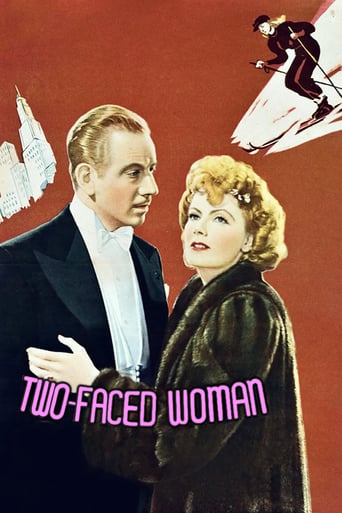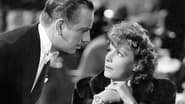FlushingCaps
This was Greta Garbo's last film, released in early 1942, co-starring Melvin Douglas. I viewed it this afternoon on DVD from a recent airing on TCM.We open with Douglas as Larry Blake, magazine publisher, vacationing at an Idaho ski lodge, telling the lodge manager that he has no interest at all in skiing. Seeing, Garbo, as Karin Borg, skiing expertly right outside the window, he decides, upon hearing she is a ski instructor, to pay for private lessons, taking her immediately away from a class of several she was teaching. He annoys her by immediately suggesting they go someplace private—letting it be clear that he is interested in anything other than skiing.Karin's response is to take him to the top of the mountain, which is something I believe few ski instructors would do because a novice on a really steep slope would be extremely dangerous. After getting off the chair lift, he almost immediately starts going down backwards and falls over a ridge and we see skis and legs sticking out from a pile of snow beneath the edge of the ridge.The next scene has two of Larry's colleagues, O.O. Miller (Roland Young) and Miss Ruth Ellis (Ruth Gordon) rushing to the lodge, worried about their missing boss. Then we see Larry entering a private cabin with Karin and learn they are newly married. Larry says he plans to immediately retire and stay there with Karin, living a simple life. By morning, he's changed his mind no fewer than three times, and leaves his new wife to return to work. She resisted his orders to go with him, as that isn't what they agreed to. To me, this proves why it is unwise to marry someone you don't even know.After many weeks of broken plans for him to come back to her she decides to go to New York and surprise him. But on seeing him friendly with an old girlfriend, Griselda (Constance Bennett) Karin decides to go back to Idaho without seeing him. Spotted by O.O., she goes along with Miss Ellis' concoction and pretends to be her own twin sister, Katherine, a fictional person.She decides her husband needs to be spied on and maneuvers herself to be with him, as she is "dating" O.O. in the role of Katherine Borg. Almost immediately, we see that Larry is at least 90% sure that this is really his wife. Whether he is just flirting with Griselda or having an affair is left uncertain. It is certain that Griselda has romantic plans for Larry.Most of the film settles into this deception mode. Karin, as Katherine, in scenes we never saw, apparently got two suitors, including O.O. believing she they were engaged to her. Mostly she tries to make a play for Larry, wanting him to dislike her "city" ways so he'll go back to Karin. At one point she directly tells him to go to Karin, but he insists he is more interested in her.They wind up back in Idaho and Larry has a terrible time skiing down the mountain, falling and getting up over and over (something only an expert skier could do), as Karin skis down trying to help him stop. He winds up in a lake and suddenly their problems are over as the movie ends.If the review sounds ridiculous, that's the way the movie was. There were few scenes supposed to be funny, but it was too lighthearted to be a good drama. Even a supposed screwball comedy has to have some measure of believability in the script. We were never given anything other than lust to explain why these two got together—they had absolutely nothing in common and we never got any scene, like most "romantic" films where they dated and did something together that made them both laugh together happily. Just—BAM—these strangers are married. And Larry is more interested in his magazine than his wife on his wedding night? For him to go back to New York for a few days to fix a problem is fine. But as shown, it was many weeks he stayed there ignoring her. Annulment time in the real world. No need for a divorce here.What Karin sought to accomplish with her deception is rather dumb as well. She is supposed to make him want to go back to Karin by being a city girl who parties too much and drinks and such. But his world has been the big city and it makes no sense that he would yearn for the new life he, sort of, planned to have with his new bride.This might have worked better if the couple had been married for a few years and she finally talked him into giving up his magazine to retire to the ski lodge, and to help out in a crisis, he went back to the city to rescue the magazine and left her for days or a week, not a couple of months. I know, I'd be changing most of the script, but it needed drastic changing to make a good film. A "4" is a generous score.
mark.waltz
"As shocking as seeing your grandmother drunk!" I believe Louis B. Mayer said about this film. Certainly, after performances as Anna Christie, Mata Hari, Anna Karenina and the lady of the Camillas, Garbo's reputation made her the Eleanor Duse of the silver screen. But after success in the subtle comedy "Ninotchka", Garbo was ready for something quite different, and proves that, just like Meryl Streep did after her series of accent laden weepers, that she could be really funny! Unlike Streep who turned to song in a few films, Garbo dances, and quite delightfully in the "Chica Choca", a dance she makes up quite by accident, getting her evening gown stuck in her shoe to the orchestra leader's delight.The basic storyline surrounds ski instructor Garbo who spends six months teaching people how to ski and the rest of the year waiting for it to snow. When New Yorker Melvyn Douglas comes to her resort for a vacation, she rescues him after a bad fall, and they are impulsively married. But his business takes him away from her the morning after, and Garbo decides to see if he truly loves her as she is by posing as her more scandalous sister. Not much in the way of reality, but still delightful and witty, a reverse of the same director George Cukor's other 1941 classic, Joan Crawford's "A Woman's Face".It is Constance Bennett who steals the scene as the temperamental near-sighted stage star as Douglas's jilted flame who has temper tantrums like other people say good morning to their co-workers. Walking into a ladies room with a very sophisticated gait then screaming into a mirror, politely warning Garbo to keep her paws off of Douglas (not for the supposed twin's sake, but for her own) or just squinting at something, Bennett is hysterically funny. It is roles like this that today get Oscar Nominations but back in the 40's, got lost in translation.Roland Young and Ruth Gordon are fine as Douglas's business associates, Young determined to keep Douglas and Garbo apart, and Gordon aware of Garbo's ruse and in favor of it. Those looking for a hint of Gordon's future wacky old ladies are going to be disappointed; She's pretty normal in this one. Beautiful winter photography and some great New York art deco scenery make for a glamorous if not unique film in MGM's cannon of sometimes sitcomish romantic comedies that they were giving to the team of William Powell and Myrna Loy and would finally perfect with Spencer Tracy and Katharine Hepburn.
yelsnebynot
While this film is hardly the classic that Ninotchka is, it can be hardly faulted for it, as even Garbo could hardly be expected to top her stellar performance in that great comedy! I was actually quite surprised how good this film is, especially given the volume of negative press it has received through the years. Garbo, even in a slightly lesser effort, is still leagues ahead of most actresses of her day (I find Joan Crawford to be especially overrated!). Besides her forever enigmatic image, she was, perhaps surprisingly, quite adept at comedy. This film actually did very well in its day.The reasons of Two Faced Woman ultimately being Greta Garbo's last film are a bit complicated and multi-faceted. A big reason why she didn't make any films after this one was the especially strong European Box Office returns that her films enjoyed during the 20's and 30's were, with few exceptions stopped dead in their tracks by the coming of the Second World War in 1939. No doubt, the U.S. entry near the end of 1941 also impacted in a number of ways, effectively keeping Greta out of films during the remaining war years.Garbo was actually coming out of retirement in 1949 to do a film for MGM. Sadly, the project got cancelled, and Greta was apparently humiliated by the experience, and didn't wish to be in that position ever again.There are likely other details that I have missed. Suffice it to say, the film itself had nothing to do with Garbo's permanent retirement from film! If you haven't seen Two Faced Woman and get the chance to do so, check it out!
ccthemovieman-1
The story is a little slow and a little stupid. Greta Garbo doesn't look very good and I couldn't understand half the things she said because of her accent, which was exaggerated for this role. Melvyn Douglas, meanwhile, plays his normal unlikeable role and Constance Bennett is just so-so except for a couple of her screams, which were funny. On the plus side, Roland Young had the best role in the film. I wish he had more lines, as he disappeared in the second half of the story. Also, it was interesting to see Ruth Gordon look so young. I had only seen her in those crazy roles she played from the late '60s to the '80s and a whacked out old woman. Story-wise, the best part might have been the final few minutes when we see a stunt man doing amazing things on skis, pretending to be Douglas falling down the slopes. That was amazing and humorous footage.Overall, I can see where this film - Garbo's last - was not a box-office success. It just drags too much, going on and on about deceptions. It's an annoying story. Garbo knew it, too, and called it quits.





